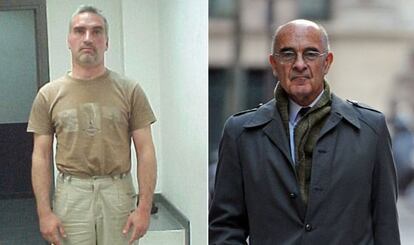Spain freed two French spies to ensure ongoing support in fight against ETA
The men had been detained in Catalonia in 2002 in possession of a custom-made sniper rifle Their mission was never clarified, but it was thought they were planning an assassination


The government of Popular Party Prime Minister José María Aznar in October 2002 succeeded in getting the Spanish justice system to free two French secret service agents who had been detained in April of that year in Manresa, Barcelona. At the time of their arrest, the men were in possession of a number of weapons, including a sniper rifle, and were allegedly preparing an assassination attempt.
Their liberation was secured in exchange for France’s continued support in the fight against Basque terrorist group ETA and in the handover of ETA members to Spain, according to one of the three magistrates who oversaw their release.
“It came directly from the Interior Ministry and the State Attorney General’s Office,” the judge explains. “There was nothing we could do to avoid them being freed.”
After their release, the secret agents promptly disappeared. Christian Piazzole and Rachid Chaouati were later declared to be in default by the Spanish courts for failing to attend a hearing in the case against them, which sought seven-year jail sentences for the two men for possessing weapons of war. Now, a decade on, the Barcelona Provincial Court has just shelved the charges against them, as well as lifting a search-and-arrest order, given that the statute of limitations on their alleged crimes has now run out.
It was a political case, one that was resolved politically from Madrid”
Piazzole – who was traveling using false documents – and his assistant Chaouati will now be able to cross borders without fear of capture. After they were arrested and put in jail, General Philippe Rondot, former head of the French secret services, requested that the Barcelona Provincial Court provisionally free the pair, on the promise they would attend their trial in February 2004. The spies, however, failed to keep their word.
France managed to avoid complying with the search-and-arrest order by deleting it from its files and denying knowledge of the whereabouts of the two men. Efforts have not been made to locate the fugitives from Spanish justice on either side of the border. “They’ve been hibernating for 10 years,” explains a source close to the French secret services.
After General Rondot visited Barcelona, the request to provisionally free the pair was passed to the same Provincial Court that has just shelved the case. The request was executed by the three judges in charge.
One of those magistrates, who prefers to remain anonymous, explains what happened. “It was a political case, one that was resolved politically from Madrid,” the source says. “France was handing over a lot of ETA members, and we weren’t to bother the French authorities. The state attorney [José María] Mena received an order from the State Attorney General, Jesús Cardenal, and he had to comply with it. Mena communicated it to us verbally, but we asked for it in writing – we weren’t going to see it through otherwise. If we hadn’t done it like that, the magistrates would have been held responsible. The court did all that it could. Our hands were tied.
If the prosecutor asks for provisional release we have to obey, as there were no victims”
“Not even Mena could freely decide what to do,” the source continues. “Had he refused to follow the order he would have had to leave the case, and they would have forced him out. I’m not criticizing him. Mena never had anything down on paper. He was called by Cardenal – who was then the State Attorney General – and he told him what he had to do. The ministry is as hierarchical as the army. Ninety percent of prosecutors do as they are told. The matter was resolved with political criteria, not criminal. These things often happen in our country.”
According to the magistrate, the intervention of the State Attorney General changed everything. “These were very serious offenses,” the source says. “Mena knew that it was a decision made by the State Attorney General and the government. The explanations that were given were embellished. If the prosecutor asks for provisional release we have to free them, because there were no victims involved. Without prosecution they can’t be held in custody.”
Cardenal, who is 85, was asked about the case in 2009, and said he had no recollection of it. Current Prime Minister Mariano Rajoy, who was then interior minister, offered the same response.
The story of an alleged frustrated assassination attempt has concluded as it began a decade ago: with a farcical chain of events to avoid jailing the two men, who had been stopped by Catalan regional police at a checkpoint and discovered with a PVC tube in the back of their Audi that contained the custom-designed rifle, complete with a silencer and a laser telescopic sight. “I saw that strange weapon, which could kill from a kilometer away,” recalled Mena, the former prosecutor in Barcelona, a year ago. “The reasonable suspicion is that they came to kill.” When consulted for this story, Mena declined to comment.
These were different times – Spain had to maintain its relationship with France”
“When General Rondot came to Barcelona it was all agreed,” explained one of the judges who freed the two spies. “He came to collect his men. They were different times – ETA was still operating and Spain had to maintain its relationship with France. That was how the magistrates experienced this case. Of course, these men were not coming here to do anything good, that’s for sure.”
General Rondot visited Mena together with a high-ranking Civil Guard officer, Ángel Gozalo, and explained that his men were on a training exercise. But in his diary, the case was described as an Operation Alpa, a selective assassination, according to the terminology of French spies.
Tu suscripción se está usando en otro dispositivo
¿Quieres añadir otro usuario a tu suscripción?
Si continúas leyendo en este dispositivo, no se podrá leer en el otro.
FlechaTu suscripción se está usando en otro dispositivo y solo puedes acceder a EL PAÍS desde un dispositivo a la vez.
Si quieres compartir tu cuenta, cambia tu suscripción a la modalidad Premium, así podrás añadir otro usuario. Cada uno accederá con su propia cuenta de email, lo que os permitirá personalizar vuestra experiencia en EL PAÍS.
¿Tienes una suscripción de empresa? Accede aquí para contratar más cuentas.
En el caso de no saber quién está usando tu cuenta, te recomendamos cambiar tu contraseña aquí.
Si decides continuar compartiendo tu cuenta, este mensaje se mostrará en tu dispositivo y en el de la otra persona que está usando tu cuenta de forma indefinida, afectando a tu experiencia de lectura. Puedes consultar aquí los términos y condiciones de la suscripción digital.








































